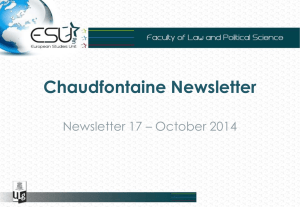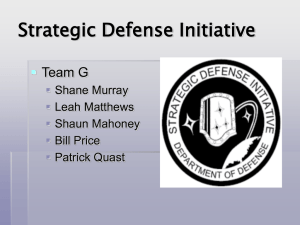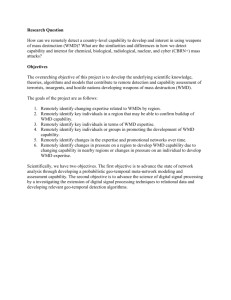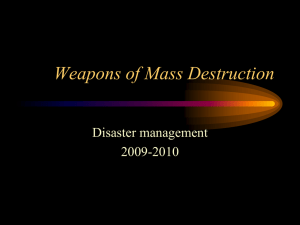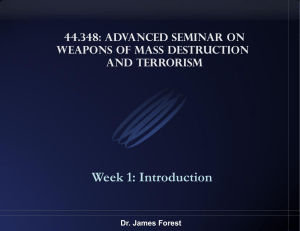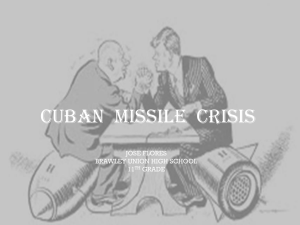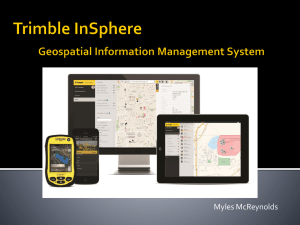Statement - The Missile Technology Control Regime
advertisement
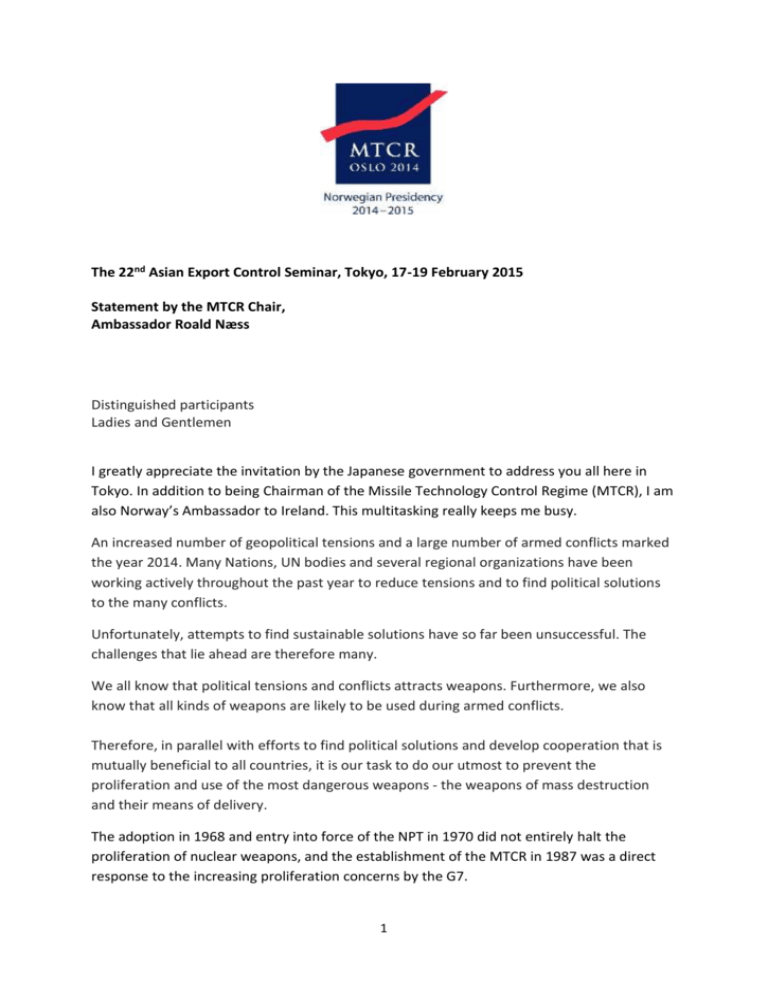
The 22nd Asian Export Control Seminar, Tokyo, 17-19 February 2015 Statement by the MTCR Chair, Ambassador Roald Næss Distinguished participants Ladies and Gentlemen I greatly appreciate the invitation by the Japanese government to address you all here in Tokyo. In addition to being Chairman of the Missile Technology Control Regime (MTCR), I am also Norway’s Ambassador to Ireland. This multitasking really keeps me busy. An increased number of geopolitical tensions and a large number of armed conflicts marked the year 2014. Many Nations, UN bodies and several regional organizations have been working actively throughout the past year to reduce tensions and to find political solutions to the many conflicts. Unfortunately, attempts to find sustainable solutions have so far been unsuccessful. The challenges that lie ahead are therefore many. We all know that political tensions and conflicts attracts weapons. Furthermore, we also know that all kinds of weapons are likely to be used during armed conflicts. Therefore, in parallel with efforts to find political solutions and develop cooperation that is mutually beneficial to all countries, it is our task to do our utmost to prevent the proliferation and use of the most dangerous weapons - the weapons of mass destruction and their means of delivery. The adoption in 1968 and entry into force of the NPT in 1970 did not entirely halt the proliferation of nuclear weapons, and the establishment of the MTCR in 1987 was a direct response to the increasing proliferation concerns by the G7. 1 Unlike for weapons of mass destruction, there is no legally binding treaty banning or restricting the production, trade and proliferation of WMD delivery systems. Furthermore, there is currently no permanent international organization, like the IAEA or the OPCW, responsible for implementing missile provisions. The MTCR is therefore unique. The establishment of MTCR was an early expression of the link between weapons of mass destruction and their delivery systems. It has been the mission of the MTCR from its origin in 1987 to coordinate national export licensing efforts aimed at “preventing proliferation of unmanned delivery systems capable of delivering nuclear weapons.” In 1992, the scope of the Regime was extended to include delivery means for all WMD. In order to accomplish its mission, the MTCR Partners have established common export policy guidelines including a common list of controlled items. The MTCR Guidelines, the Equipment, Software and Technology Annex as well as other relevant information about the MTCR is available on the MTCR webpage. The MTCR does not take export-licensing decisions as a group. Individual partners are responsible for implementing the Guidelines and Annex based on sovereign national discretion and in accordance with national legislation and practice. It is no doubt that national export licensing measures make it much more difficult for countries to succeed in acquiring sensitive items and technologies, and thereby achieving capability to produce and use WMD delivery systems. Despite this fact, the proliferation of WMD remains a threat to international peace and security, as recognised in UNSCR 1540. While concern has traditionally focused on state proliferators, it has become more evident in recent years - particularly after the tragic events of 9/11 and more recent terrorist activities in a number of countries - that a lot has to be done to decrease the risk of WMD delivery systems falling into the hands of terrorist groups and individuals. One way to counter this threat is to maintain vigilance over the transfer of missile equipment, material and related technologies. The role of the MTCR partners in this regard is important, as is the responsibility of all states according to UNSCR 1540. Allow me at this point to give you a brief update of the last Plenary Meeting of the MTCR, held in Oslo in October 2014. 2 The main purpose of the meeting was to review and evaluate the MTCR’s activities over the last 12 months and to intensify the efforts of MTCR partners to prevent the proliferation of WMD delivery systems. Partners emphasised that observance of the MTCR Guidelines by as many states as possible will contribute substantially to limiting the risks of proliferation of delivery systems for WMD and to fostering international security. Partners encouraged the continuation of efforts to assist non-member countries and other interested parties in implementing missile-related export controls as required under UNSCR 1540. Furthermore, Partners welcomed that a number of countries who are not members of the Regime, have taken on commitments to observe the Guidelines as a basis in their national export control concerning missile technology. The Plenary meeting also adopted a new policy on adherence. In short: MTCR will now invite countries to declare full adherence to the MTCR Guidelines and formally notify the MTCR POC in writing, on a voluntary basis, of their political commitment to control all the items on the MTCR Annex, including any subsequent changes to the Annex and Guidelines. At the meeting in Oslo, partners underlined that such adherence is o (1) entirely unilateral by the non-partner country, o (2) is not subject to any acceptance decision by the Regime, and o (3) becomes effective automatically upon the POC’s receipt of the formal notification. Partners also underlined that there is no relationship between “adherence” and membership in the Regime. This formalised adherence provides in my view, an opportunity for non-members to confirm their political commitment towards missile non-proliferation – and therefore represents a substantive non-proliferation initiative. At the Oslo Plenary meeting, partners also held a thorough exchange of information on missile proliferation developments. Within the framework of the MTCR mandate, they conducted extensive discussions on various country issues and expressed concerns associated with global missile proliferation activities in particular regarding ongoing missile 3 programmes in the Middle East, Northeast Asia and South Asia, which might fuel missile proliferation activities elsewhere. Partners also confirmed their commitment to implement relevant UNSCR on nonproliferation including some country specific resolutions, and agreed to continue exchanging views on missile programme developments. The critical importance of the MTCR’s on-going technical work was strongly emphasised at the meeting. Partners underlined that the rapid technological development related to sensitive items and technologies continues to require great awareness and effective actions to address these developments. They recognised that the Equipment, Software, and Technology Annex is a cornerstone of the work done by the MTCR to prevent illegal transfers of missile technologies, and expressed deep appreciation for the accomplishments of the MTCR’s Technical Expert Meeting. The Technical Expert Meeting in Oslo agreed on several updates and clarifications of the Annex. The work of the Licensing and Enforcement Expert Meeting (LEEM), and the Information Exchange Meeting (IEM) is also vital for the Regimes effectiveness. In Oslo, Partners continued discussions on a number of issues, including i. ii. iii. iv. v. vi. proliferation trends; procurement activities and strategies in support of programmes for WMD delivery means; risks and challenges posed by intangible technology transfers; key technology trends in missile programmes; catch-all controls for non-listed items; brokering, transit and transshipment issues and on efforts to exploit them to evade export controls. The discussions at the Oslo plenary showed that constant awareness, information sharing, updating of MTCR countries’ export control systems and enforcement efforts is of great importance and has great impact on Partners’ work towards curbing proliferation of WMD means of delivery. International and regional cooperation in order to establish high and common control standards and to exchange information and experience, play a vital non-proliferation role. In this context, I underline the decisive importance of national export control systems, and the effective enforcement at national level. In order to succeed in our non-proliferation efforts, governments and companies must also work together. 4 Japan’s contribution in the area of non-proliferation and export control is highly recognized, and I congratulate them on the successful conduction of the 22nd Asia export control seminar. Thank you for your attention. 5

